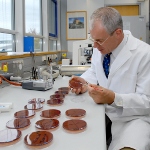Bacteria

Bacteria are microorganisms which are composed of one single cell. They occur everywhere in our body and in the environment. As opposed to viruses, bacteria can multiply themselves. They divide in the middle and constitute autonomous cells. This is referred to as bacterial growth or bacterial multiplication.
Useful bacteria can become dangerous, too
Many bacteria are vital for humans, like those which prevent a multiplication of pathogens. However, in some cases even useful bacteria can become pathogens and cause an infection. These infections are possible in humans with a weakened immune system or if bacteria penetrate our body e.g. through wounds.
This is often the case for zoonoses, i.e. for pathogens which are transmitted from animals to humans.
What does BfR do?
BfR assesses risks which are caused by damaging bacteria in foods. Bacteria can reach foods through , poor hygiene and microorganisms from agriculture and more. Such microbial pathogens, which are transmitted from animals via foods to humans, are referred to as zoonotic agents. Diseases which can be transmitted from animals to humans are consequently referred to as "zoonoses".
Analyses and risk assessments at BfR focus on the following bacterial species/zoonotic agents. They cause the classical symptoms of foodborne diseases: nausea, diarrhoea and vomiting
- Acrobacter spp.
- Bacillus cereus
- Campylobacter spp.
- Clostridia
- Coxiella burnetii
- Escherichia coli
- Enterobacter spp.
- Listeria monocytogenes
- Mycobacteria
- Salmonella
- Staphylococci
- Yersinia
- Vibrio
Many bacteria can develop toxins (toxic substances) and deploy a harmful effect in this way. As far as toxigenic microorganisms are concerned, it is differentiated between bacteria which can develop their toxin already in the food and those who release their toxins only after uptake by humans in the gastrointestinal tract.
